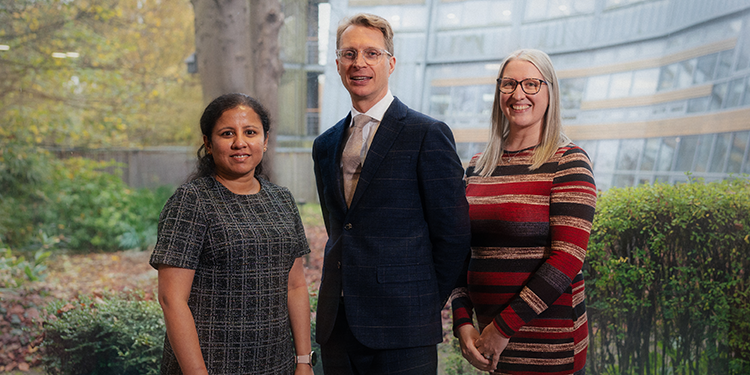University of York Champions the Fight Against Vision Loss with Age-Related Macular Degeneration (AMD) Research Event
Posted on Wednesday 4 December 2024

This devastating disease affects over 700,000 older adults in the UK, making it the leading cause of vision loss in the country. Held at the University of York campus, the event brought together patients, supporters, and leading researchers, offering an inspiring glimpse into cutting-edge research advancements and the life-changing impact of donor contributions.
Since its founding in 2023, the Yorkshire Macular Degeneration Fund - with lead researchers Professor Richard Gale and Professor Dimitris Lagos at the helm - has been working to raise research funds to improve diagnosis, treatment, and quality of life for those affected by AMD. The fund’s patron, Dame Judi Dench, and a dedicated team of researchers are committed to tackling this disease, which affects 1 in 8 individuals over 80. The event’s panel of experts, including clinicians and researchers, unveiled key breakthroughs ranging from the use of advanced imaging to detect AMD earlier to the role of the brain in vision loss.
Research Talk Highlights
- Early Intervention: Professor Richard Gale, Honorary Consultant Medical Ophthalmologist at York and Scarborough Teaching Hospitals NHS foundation Trust and Professor of Ophthalmology at Hull York Medical School, and Professor Dimitris Lagos, Professor of Immunology at University of York and Director of Research (York) at Hull York Medical School, underscored the transformative impact of early diagnosis of AMD, revealing how advanced scanners can detect treatable AMD stages, potentially preventing severe, irreversible vision loss.
Professor Gale explained: “By detecting AMD at its treatable stages using advanced scanners, we can significantly reduce the risk of severe vision loss,” he explained. “If untreated, the damage is irreversible, and this impacts not only vision but also overall quality of life.”
- Holistic Care: Mrs Archana Airody, Consultant Ophthalmologist at York and Scarborough Teaching Hospitals NHS foundation Trust, presented findings which evaluated the quality-of-life impact of AMD over four years. She highlighted the disease’s profound effect on independence, mental health, and emotional well-being, emphasising the need for comprehensive support systems alongside treatment.
“These studies provided critical insights into how treatment can stabilise or even improve vision over time,” Mrs Airody shared. She noted the effectiveness of the medication Aflibercept (Eylea) in reducing fluid levels in the retina, a hallmark of wet AMD. “Patients consistently reported satisfaction with the care and information they received, but our findings also underline the importance of comprehensive support that addresses emotional wellbeing. Mrs Airody emphasised the need for targeted interventions to enhance mental health support for patients with AMD, particularly as anxiety and depression are common. “While treatment for the eye is crucial, we must also focus on holistic care to improve overall quality of life,” she added.
- Brain and Vision Connection: Dr Rachel Hanson, Research Fellow in Ophthalmology at York & Scarborough Teaching Hospitals NHS Foundation Trust and Honorary Lecturer at Hull York Medical School, presented innovative research on how AMD-induced vision loss affects brain function, urging for treatment strategies that address both ocular and neural health.
Dr Hanson presented compelling insights into how AMD affects brain structure and function. Using magnetic resonance imaging (MRI), her team discovered that prolonged vision loss leads to changes in the brain’s occipital lobe, responsible for processing visual information. “The relationship between the eye and brain highlights the need for comprehensive treatment strategies,” Dr. Hanson explained. “While advances in restoring eye function are encouraging, they must be complemented by measures to preserve brain health. This ensures a more effective rehabilitation for patients with AMD.”
Following the research talks, a panel discussion between Professor Gale and Geraldine Hoad, Head of Research at the Macular Society, highlighted the key role of charities and advocacy in AMD research. Geraldine Hoad emphasised the Macular Society’s role in bridging the gap between clinical care and patient needs. She detailed efforts to support individuals grappling with AMD through helplines, counselling, and public awareness campaigns. During the Q&A session, she explained, “For many, a diagnosis of AMD leads to profound emotional and mental health challenges. We aim to provide hope, support, and advocacy to ensure that no one faces this journey alone”.
Together, the experts outlined a multi-faceted roadmap for tackling AMD. Prevention strategies, such as public health campaigns encouraging UV eye protection, smoking cessation, and proper nutrition, were highlighted as key measures. Experts also discussed the potential of gene therapy and personalised medicine to revolutionise care for AMD patients. As healthcare shifts towards preventative care, researchers are hopeful that a combination of cutting-edge technology, community involvement, and robust policy support for early detection will pave the way for better outcomes. Professor Dimitris Lagos emphasised, “The future lies in integrating screening and prevention programs into everyday healthcare. Together, we can slow the trajectory of AMD and safeguard sight for millions.”
Attendees left inspired by the fund’s unwavering commitment to AMD research, having witnessed firsthand how their generosity fuels breakthroughs. The Yorkshire Macular Degeneration Fund has already funded two full-time research positions and is now focused on building the evidence base for a national screening programme for AMD. This ambitious vision is driving the fund’s current fundraising efforts to secure essential imaging technology to support early detection and deepen our understanding of disease progression.
Together, we can safeguard sight for future generations.
You can also sign up and receive regular e-updates from the Yorkshire Macular Degeneration Fund.
